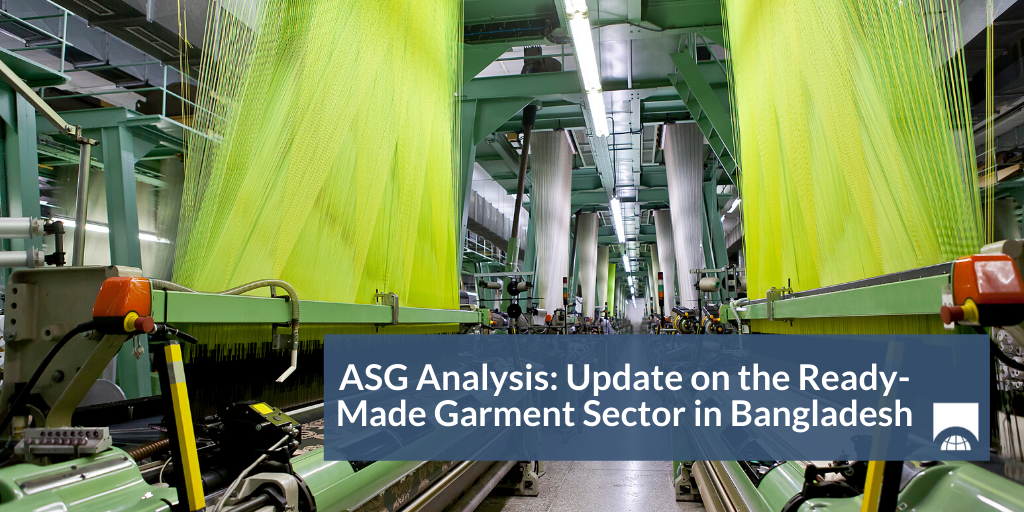ASG Analysis: Update on the Ready-Made Garment Sector in Bangladesh
Key Takeaways
- Recent developments and news stories about Bangladesh’s garment sector have highlighted the work that still needs to be done in order to improve factory conditions in Bangladesh.
- The RMG Sustainability Council (RSC), launched by the Bangladesh Garment Manufacturers and Exporters Association (BGMEA) with support from the Bangladeshi government, is the most recent attempt by stakeholders to sustain the momentum generated by groups such as the Accord and the Alliance. With the BGMEA signing a MoU with the Accord, the latter will transition its operations to the RSC at the end of May 2020.
- Given this development, companies in the RMG sector should view this as a window of opportunity to demonstrate their commitment to the RSC’s objective of ensuring safe factory conditions in Bangladesh.
- Companies should highlight direct investments to improve factory conditions in Bangladesh as complementary to the BGMEA and RSC efforts, and consider bolstering their commitment through credible sustainability and social impact programs.
BGMEA reaches an agreement with the Accord
On May 8, 2019, the Accord Steering Committee and the BGMEA, with the endorsement of the Government of Bangladesh, signed an MoU to establish a national RMG safety entity to be called the RMG Sustainability Council (RSC). The MoU was accepted by the Appellate Court in Bangladesh on May 19, 2019, allowing the Accord Bangladesh office to continue its operations for 281 working days. After the transition period of 281 working days, the RSC will take over the Accord’s Bangladesh operations and take over Accord’s infrastructure and staff.
According to the agreement, the RSC will be governed by representatives appointed by BGMEA, global brands, and both global and national trade unions. The RSC will coordinate its operations with the Government of Bangladesh to ensure that the RSC’s work compliments the Bangladeshi government’s Remediation Coordination Cell; this is a national initiative to monitor and coordinate the post-inspection remedial work at garment factories in Bangladesh.
The goal is for the RSC to eventually include all RMG factories in Bangladesh – this will be achieved through a phased approach, where the RSC will include Accord factories, followed by Alliance factories, and then finally expand its operations to all RMG factories in the country.
Key Operational Details of the RSC
The RSC’s board will have 6 representatives from the BGMEA, 6 representatives from global brands, and 6 representatives from trade unions (4 local and 2 global). Decision-making will occur through consensus and not by voting, and details on how the RSC will coordinate its operations with the government are yet to be worked out. The RSC will follow the policies and protocols developed by the Accord for the time being, but the organization’s board can propose and agree upon any changes as it sees fit, through consensus. The organization has not yet decided on the role of the international Secretariat.
Proposed Next Steps for RSC
Sub-Committees to implement the MoU have already been set up, and the RSC’s board members are expected to be appointed by the end of November 2019. Before the end of 2019, the BGMEA will establish a company in Bangladesh to formalize the RSC as an organization, and senior management of the organization, including the Managing Director, is expected to be appointed by January 2020.
Business Implications
Given this backdrop, companies in the RMG sector should renew their commitments to Bangladesh and position their efforts as complementary to the BGMEA’s efforts. Given that the RSC has the support of the BGMEA and of the Bangladeshi government, competing coalitions may find it difficult to carve out a space for themselves in the country. The agreement reached with the Accord and the explicit goal that the RSC will eventually oversee all RMG factories in the country, with close coordination with the government, means that new or existing coalitions are unlikely to have the necessary political and business support on the ground in Bangladesh.
However, companies can position their efforts as being complementary to the RSC’s objectives as they seek to execute a complicated process of improving factory safety and working conditions. They should also showcase their global sustainability and social impact capabilities to relevant stakeholders and highlight their commitment to not only procuring supplies from Bangladesh, but also as actors who want to have a positive social and environmental impact in the country.
In the current environment, it will be necessary for companies to work directly with their supplier factories, while also highlighting that they are complementing and not competing with what the RSC and the Bangladeshi government is seeking to do in the coming months.
About ASG
Albright Stonebridge Group (ASG) is the premier global strategy and commercial diplomacy firm. We help clients understand and successfully navigate the intersection of public, private, and social sectors in international markets. ASG’s worldwide team has served clients in more than 120 countries.
ASG's South Asia practice has extensive experience helping clients navigate markets across South Asia. For questions or to arrange a follow-up conversation please contact Uzair Younus.

